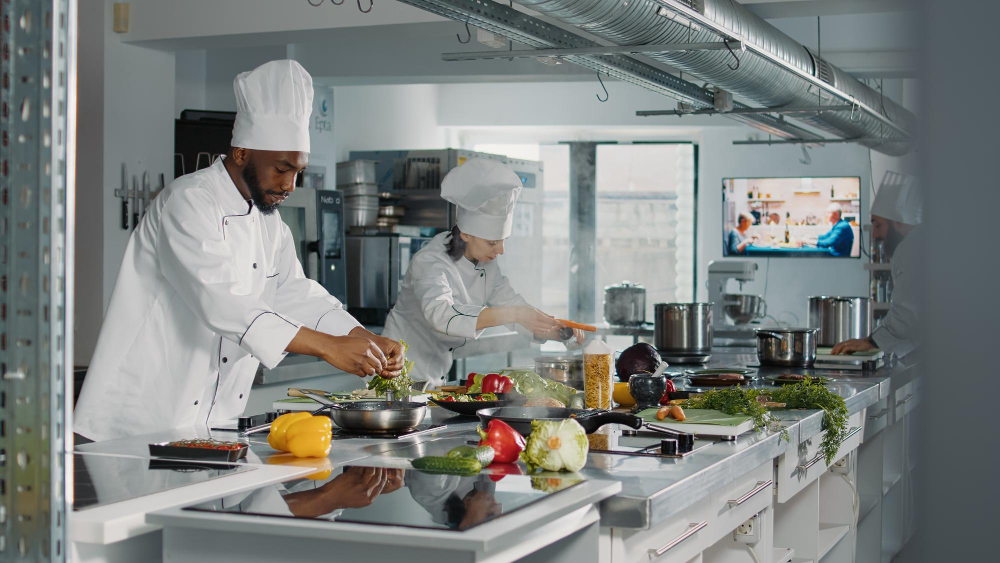Last updated on
In an era where environmental consciousness is becoming increasingly crucial, the restaurant industry is stepping up to the plate to embrace sustainability. Diners are not only seeking exquisite culinary experiences but are also mindful of the impact their choices have on the planet.
As a restaurant owner or manager, adopting sustainable practices not only aligns with the growing eco-friendly sentiment but can also enhance your brand reputation and attract a broader clientele. In this article, we’ll explore some innovative ways to embrace sustainability in your restaurant, from sourcing local ingredients to implementing waste reduction strategies.
Nurturing Community and Reducing Carbon Footprint

One of the most impactful ways to embrace sustainability in your restaurant is by prioritizing local and seasonal sourcing of ingredients. Not only does this support local farmers and communities, but it also significantly reduces your restaurant’s carbon footprint.
By sourcing locally, you minimize the transportation distances for your ingredients, cutting down on emissions associated with long-haul transportation. Moreover, seasonal ingredients are more likely to be abundant, fresher, and more cost-effective.
This approach not only contributes to the overall sustainability of your business but also establishes strong ties with local producers, creating a mutually beneficial relationship. By featuring a menu that highlights the best of each season, you not only provide your customers with fresh and flavorful dishes but also showcase your commitment to sustainable practices.
From Farm to Fork and Beyond
Waste reduction is a critical aspect of sustainable restaurant management that extends from the farm to the fork and beyond. Implementing effective waste reduction strategies not only minimizes environmental impact but can also result in substantial cost savings for your establishment.
Start by closely monitoring your inventory and adjusting ordering practices to minimize food waste. Creative menu planning can also play a role; for example, turning food scraps into compost or creating innovative dishes from commonly discarded parts of vegetables.
Beyond the kitchen, consider implementing eco-friendly packaging and encouraging customers to bring their containers for takeout. An effective waste reduction strategy should encompass not just food waste but also address single-use plastics and other materials that contribute to environmental degradation.
By taking a holistic approach to waste reduction, your restaurant can actively contribute to a more sustainable and responsible food industry.
Illuminating the Path to Sustainability

The restaurant industry is notorious for its energy consumption, from cooking equipment to lighting and HVAC systems. Embracing energy-efficient practices is not only environmentally responsible but can also lead to significant cost savings.
Consider upgrading to energy-efficient appliances, incorporating LED lighting, and implementing smart thermostat systems to regulate heating and cooling. Additionally, train staff to be mindful of energy usage, turn off equipment when not in use, and optimize workflows to reduce idle times.
Renewable energy sources, such as solar panels, can also be explored to power your restaurant sustainably. By adopting these energy-efficient measures, your restaurant not only contributes to a greener planet but also sets an example for others in the industry to follow suit.
Sustainability, when integrated into your overall business strategy, becomes a beacon that attracts environmentally-conscious customers and enhances your restaurant’s overall reputation.
Elevating Aesthetics with Sustainability
Investing in solid wood restaurant tables can be a transformative step towards sustainability while enhancing the aesthetic appeal of your dining space. Several specialized companies focus on crafting top-quality handcrafted tables using reclaimed and new lumber.
By choosing reclaimed wood, sourced from old structures or responsibly managed forests, you contribute to the preservation of natural resources and minimize the environmental impact of logging. These companies often employ skilled artisans who transform these materials into unique, bespoke tables that add character and warmth to your restaurant.
Beyond the environmental benefits, solid wood restaurant tables are durable and long-lasting, providing a sustainable alternative to furniture that may need frequent replacement.
As customers increasingly value authenticity and eco-conscious choices, investing in these handcrafted tables not only aligns with sustainability but also elevates the overall dining experience, creating a harmonious blend of style and responsibility.
Eco-friendly Practices for Sustainability
In addition to sourcing local ingredients and implementing waste reduction and energy-efficient strategies, consider extending your green initiatives beyond the plate. Implement eco-friendly practices throughout your restaurant, from using biodegradable cleaning supplies to adopting water-saving technologies.
Incorporating these practices ensures that every aspect of your operation aligns with sustainability, contributing to a holistic approach that resonates with environmentally-conscious customers. Additionally, engaging in community initiatives, such as partnering with local environmental organizations or participating in neighborhood clean-up efforts, establishes your restaurant as a responsible and socially aware establishment.
These initiatives not only benefit the environment but also foster a sense of community, further enhancing your restaurant’s positive impact.
Fostering a Culture of Sustainability
Another crucial aspect of embracing sustainability in your restaurant is fostering a culture of awareness and responsibility among both staff and customers. Provide training sessions for your team to educate them about sustainable practices and the reasoning behind them.
Encourage staff to share their ideas for improvement and involve them in the decision-making process regarding sustainability initiatives. Furthermore, communicate your commitment to sustainability transparently with your customers.
Use menu inserts, signage, and social media platforms to highlight your eco-friendly practices and the positive impact of their dining choices. Engaging both staff and customers in the journey towards sustainability creates a shared sense of responsibility and fosters a community that values conscious consumption.
Embracing sustainability in your restaurant is not just a trend; it’s a commitment to nurturing a better future for our planet. By incorporating local and seasonal sourcing, waste reduction strategies, energy-efficient practices, investing in solid wood restaurant tables, extending green initiatives beyond the plate, and fostering a culture of sustainability, your restaurant becomes a beacon of responsible business.
The choices you make today resonate not only with environmentally-conscious consumers but also contribute to a larger movement within the food industry. As more restaurants adopt sustainable practices, we collectively pave the way for a greener, healthier, and more responsible future.
Related reading:
Table of Contents





